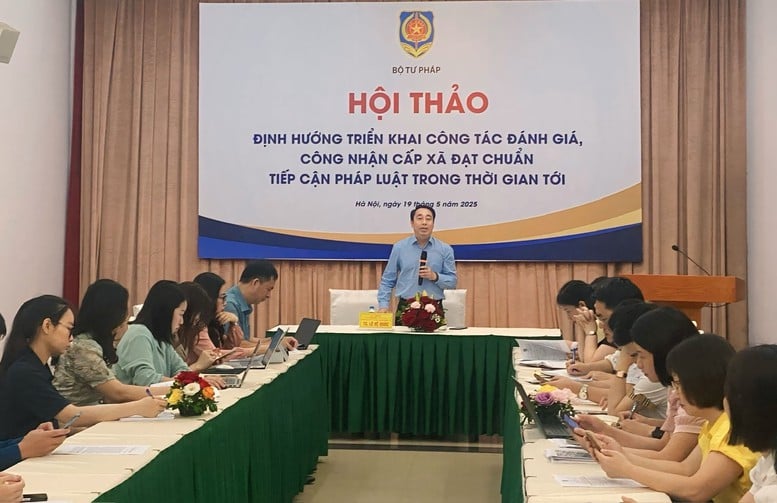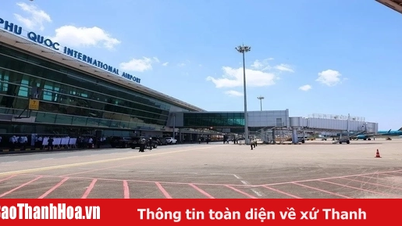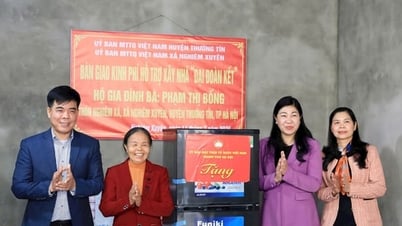
Director of the Department of Legal Dissemination,Education and Legal Aid Le Ve Quoc speaks at the seminar. Photo: VGP/Dieu Anh
Speaking at the opening of the seminar, Mr. Le Ve Quoc, Director of the Department of Legal Dissemination, Education and Legal Aid ( Ministry of Justice ) said that in order to create a unified and synchronous legal basis in implementing legal access standards for commune level to improve the effectiveness and efficiency of state management by law at the grassroots level; enhance the sense of responsibility in performing public duties of grassroots government leaders; enhance the right to access legal information, disseminate and educate the law, and implement democracy at the grassroots level, the Prime Minister issued Decision No. 25/2021/QD-TTg regulating communes, wards and towns that meet legal access standards (Decision No. 25/2021/QD-TTg).
After more than 3 years of implementation, the organization of assessment and recognition of communes, wards and towns meeting legal access standards has been implemented synchronously by localities and gradually become routine.
The results of assessment and recognition of communes, wards and towns nationwide achieved a high rate. In 2022, 10,073/10,743 commune-level units were recognized as meeting legal access standards, reaching 93.8%. In 2023, 10,188/10,671 commune-level units were recognized as meeting legal access standards, reaching a rate of 94.7%. In 2024, 9,506/9,807, reaching a rate of 96.9%.
However, in the process of guiding, monitoring, inspecting and conducting reviews and evaluations of legal documents regulating the assessment and recognition of communes, wards and towns that meet legal access standards, the Department of Dissemination, Legal Education and Legal Aid found that some provisions of Decision No. 25/2021/QD-TTg are still inadequate, limited and not suitable to the current practical context.
For example, there is overlap in the purpose of assessing and recognizing communes, wards and towns that meet legal access standards, the content of legal access criteria and other sets of criteria and standards for assessing commune-level authorities;
In addition, the authority, order, and procedures for assessing and recognizing communes, wards, and towns that meet legal access standards are no longer suitable for the two-level government model; the time for assessing and recognizing communes, wards, and towns that meet legal access standards is not appropriate.
Suggesting and guiding the discussion, Mr. Le Ve Quoc asked the delegates to focus on exchanging and discussing whether it is necessary to continue to maintain or not to carry out the work of assessing and recognizing communes, wards and towns that meet the standards of legal access? In case of proposing to continue to carry out this work, in what direction should the set of criteria and the assessment and recognition mechanism be amended to overcome the overlap between the sets of criteria for assessing grassroots authorities; ensuring comprehensiveness, objectivity, and substance...

Delegates share opinions at the discussion. Photo: VGP/Dieu Anh
It is necessary to develop a set of evaluation indexes from the perspective of beneficiaries.
Many delegates said that, To meet the new situation, it is necessary to study and develop a new Decision to replace Decision No. 25/2021/QD-TTg in the direction of determining criteria for assessing people's legal access standards; at the same time, build an assessment mechanism to ensure comprehensiveness, objectivity, substance, consistency with the Constitution and newly issued legal documents and in accordance with the current practical situation.
Director of the Department of Justice of Quang Ninh province Le Thanh Cung said that Decision No. 25/2021/QD-TTg of the Prime Minister is one of the regulations to create responsibility for local authorities at the grassroots level to perform their responsibilities in the legal field.
However, the responsibility for local authorities is not only contained in one document, but also in the assessment of grassroots authorities. "There are many sets of criteria and standards for assessing commune-level authorities such as: National criteria for new rural communes and advanced new rural communes, Criteria for assessing wards, towns, districts, towns, and cities that meet civilized urban standards, and Criteria for assessing communes, wards, and towns that meet security and order standards. These sets of criteria all have criteria and indicators that the Judicial sector must also participate in the assessment process," Mr. Le Thanh Cung emphasized.
From a local perspective, Mr. Le Thanh Cung proposed to abolish Decision No. 25/2021/QD-TTg to reserve resources for other tasks, ensuring higher efficiency. If the Decision is continued, it is necessary to calculate the amendment and use of indicators so that there is no duplication and no waste of resources, including evaluation time.
At the same time, it is proposed that the Department of Legal Dissemination, Education and Legal Aid research and develop a set of indicators, but with an approach of assessment from the perspective of beneficiaries. If this set of indicators is made public, this is also a channel to create goals and achieve the goals as per Decision No. 25/2021/QD-TTg.
"The problem is that to evaluate the substance, we must calculate the survey criteria so that people can read and understand easily, and at the same time, we need the coordination of organizations. This will be much more effective," emphasized Le Thanh Cung, Director of the Department of Justice of Quang Ninh province.
Ms. Pham Thi Thanh Huong, Deputy Director of the Hanoi Department of Justice, said that when implementing Decision No. 25/2021/QD-TTg, Hanoi also realized that there were many advantages, but besides those advantages, there were still many shortcomings and difficulties in the implementation process, such as in localities and establishments, the assessment and recognition of this legal access standard was the job of the Department of Justice and the judicial sector.
Therefore, in addition to the human resources to implement this assessment work at the grassroots level (each commune and ward has only 1 judicial - civil status officer), this officer must concurrently take on many tasks. In addition, the implementation of the assessment does not really receive substantial coordination from relevant agencies and departments...
In addition, the re-evaluation has criteria that overlap with some other evaluation criteria in the process of implementing the common goal.
According to Ms. Pham Thi Thanh Huong, in the context of the requirement to streamline, reorganize the apparatus, merge administrative units and implement the two-level local government model, in the coming time, Hanoi will have 126 commune-level administrative units. If we continue to assess and recognize legal access standards for these 126 commune-level administrative units, it is necessary to clearly stipulate the content, records, documents and especially the responsibilities of agencies and organizations for the assessment and recognition of communes meeting legal access standards to be appropriate, clearly defining individual responsibilities, coordination responsibilities and implementation mechanisms.
Furthermore, there is a great need to increase resources for assessing legal access standards at the provincial level. This will also be a major challenge in the current context of streamlining the apparatus.
Sharing the same view with the Department of Justice of Quang Ninh province, Ms. Pham Thi Thanh Huong said that resources should be allocated to other tasks suitable to the current context; if Decision 25 is still to be implemented, there needs to be a specific set of criteria to evaluate closely to the current practical situation, that is, in the context that provinces and communes only have two levels of government.
Dieu Anh
Source: https://baochinhphu.vn/dinh-huong-cong-tac-danh-gia-cong-nhan-cap-xa-dat-chuan-tiep-can-phap-luat-10225051913335322.htm


![[Photo] Panorama of the Opening Ceremony of the 43rd Nhan Dan Newspaper National Table Tennis Championship](https://vphoto.vietnam.vn/thumb/1200x675/vietnam/resource/IMAGE/2025/5/19/5e22950340b941309280448198bcf1d9)
![[Photo] General Secretary To Lam attends the conference to review 10 years of implementing Directive No. 05 of the Politburo and evaluate the results of implementing Regulation No. 09 of the Central Public Security Party Committee.](https://vphoto.vietnam.vn/thumb/1200x675/vietnam/resource/IMAGE/2025/5/19/2f44458c655a4403acd7929dbbfa5039)
![[Photo] President Luong Cuong presents the 40-year Party membership badge to Chief of the Office of the President Le Khanh Hai](https://vphoto.vietnam.vn/thumb/1200x675/vietnam/resource/IMAGE/2025/5/19/a22bc55dd7bf4a2ab7e3958d32282c15)

![[Photo] Close-up of Tang Long Bridge, Thu Duc City after repairing rutting](https://vphoto.vietnam.vn/thumb/1200x675/vietnam/resource/IMAGE/2025/5/19/086736d9d11f43198f5bd8d78df9bd41)





















![[Photo] Prime Minister Pham Minh Chinh inspects the progress of the National Exhibition and Fair Center project](https://vphoto.vietnam.vn/thumb/1200x675/vietnam/resource/IMAGE/2025/5/19/35189ac8807140d897ad2b7d2583fbae)





























































![[VIDEO] - Enhancing the value of Quang Nam OCOP products through trade connections](https://vphoto.vietnam.vn/thumb/402x226/vietnam/resource/IMAGE/2025/5/17/5be5b5fff1f14914986fad159097a677)





Comment (0)